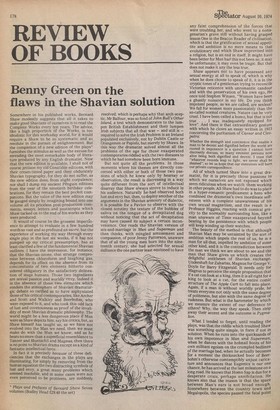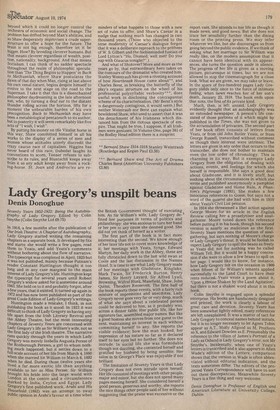Benny Green on the flaws in the Shavian solution
Somewhere in his published works, Bernard Shaw modestly suggests that all it takes to make good Shavians of ourselves is to read the Complete Works every ten years. The advice, like a high proportion of the Works, is too idealistic for this workaday world, for it would require a Shaw to be so systematic and so, resolute in the pursuit of enlightenment. But the completion of a new edition of the plays* furnishes the stimulus as well as the excuse for rereading the most remarkable body of literature produced by any English dramatist. Now that the new edition is available, I shall not of course jettison my old Constable editions, with their cream-tinted paper and their obdurately Shavian typography, for they do not suffer, as the new edition does, from slight corpulence; nor shall I dump my ancient Penguin editions from the year of the ninetieth birthday celebrations, for they remain the best pocket companions. But the value of the new edition may be gauged simply by imagining bound into one volume all its priceless post-production comments, essays, letters and postscripts which Shaw tacked on to the end of his works as they were produced. It would of course be the grossest impertinence to attempt to evaluate in a few hundred words so vast and so profound an ouvre, but the experience of working my way through every single play in the last six weeks, if it has not pumped up my critical presumption, has at least clarified a few of the fundamental Shavian outlines. I have the impression, for instance, that the Shavian ozone, that strange compromise between chloroform and laughing gas, depends for its effect on the absence from its concomitants of two elements hitherto considered obligatory in the satisfactory delineation of stage humans. Those two ingredients are sexual passion and worldly envy. Indeed it is the absence of these two elements which renders the atmosphere of Shavian dramaturgic debate so rarified as to have asphyxiated those of his critical contemporaries, like Archer and Scott and Walkley and Beerbohm, who were exposed to it, and who took this odd lack of lust and covetousness as proof of the invalidity of most Shavian dramatic philosophy. The world might be a less dangerous place if Man were as Shaw depicts him, say his critics, but, as Shaw himself has taught us, as we have not evolved into the Man we need, then we must make do with the Man we know, and as he bears no more than a superficial resemblance to Tanner and Bluntschli and Magnus, then there is no point to Shavian drama except as a kind of fantastic intellectual farce.
In fact it is precisely because of these deficiencies that the exchanges in the plays are illuminating, for simply by removing from the human equation the two distracting symbols of lust and envy, a great many problems which insoluble, nsoluble, and in some cases were not even perceived to be problems, are suddenly.
* Plays and Prefaces of Bernard Shaw Seven volumes (Bodley Head £29.40 the set)
resolved; which is perhaps why that arch-sceptic, Mr Balfour, was so fond of John Bull's Other Island, a text which demonstrates to the lumpen British Establishment and their lumpen Irish subjects that all that was — and still is — required to solve the Irish Problem is an Ireland Populated exclusively, not by Dublin Castle or Orangemen or Papists, but merely by Shaws. In this way the dramatist solved almost all the problems of the age for those exasperated contemporaries riddled with the two diseases to which he had somehow been born immune.
But not quite all the problems. In those moments where his themes are directly concerned with either or both of those two passions of which he knew only by hearsay or observation, the result is distressing in a way quite different from the sort of intellectual disarray that Shaw always strove to induce in his audience. Naturally he had observed both lust and envy but, then, to deploy another of the arguments in the Shavian armoury of dialectic, it is possible for a Pavlov to observe with the closest scrutiny the texture of the bubbles of saliva on the tongue of a decapitated dog without noticing that the act of decapitation may have caused its subject a certain inconvenience.. One reads the Shavian version of sex-and-marriage in Man and Superman and then thinks, with mingled amusement and compassion, of poor Jenny Patterson, unaware that of all the young men born into the nineteenth century, she had selected for sexual dalliance the one partner least equipped to have
any faint comprehension of the forces that were troubling her, and who went to a nonagenarian's grave still without having grasped lesson One in the Beacon Reader of civilisation, which is that the gratification of sexual appetitite and ambition is no mere means to that evolutionary end which Shaw improvised into a religion, but is an end in itself. It might have been better for Man had this not been so; it may be unfortunate; it may even be tragic. But that does not make it any the less true.
Shaw appears not to have possessed any sexual energy at all to speak of, which is why when he does choose to speak of it, it is in the cryptic tones of a gentleman trying to reconcile Victorian reticence with unromantic candour and with the preservation of his own ego. He once told Stephen Winsen, "Women have been , a ghastly nuisance in my life. Do you think impotent people, as we are called, are sexless? We fall for women more passionately than the so-called normal creatures. Nature can be very cruel. I have been called a homo, but that is not true . . I was inadequately equipped for love". And there is that extraordinary gesture with which he closes an essay written in 1913 concerning the puritanism of Caesar and Cleopatra: Whether the strength-and continence that enable a man to be decent and dignified before the world are rooted in impotence is a question I cannot here discreetly discuss, so many eminent persons now alive being both dignified and decent. I trust that "whatever records leap to light, we never shall be shamed"; so let us hope that our executors will burn our private correspondence.
All of which turned Shaw into a great dramatist, for it is precisely those passions to which we ourselves are not exposed which seem ridiculous when we watch them working in other people. All Shaw had to do was to place in a hyper-romantic predicament a hero who combined the dramatist's own inordinate selfesteem with a complete unawareness of his own sexuar magnetism, and the result is a Professor Higgins, reacting with comical gravity to the normality surrounding him, like a man unaware of Time exasperated beyond bearing by the persistence with which people will keep winding up their watches. The beauty of the method is that although Shavian Man may be untainted by the sort of ambition which impels the rest of us, he is a man for all that, impelled by ambition of some other kind, and it is the contradiction between the man we think we are about to see and the man that Shaw gives us which creates the delightful antitheses 'of Shavian exchange, Undershaft for Zaharias, Magnus for George V, Doyle for Barry Fitzgerald. It needs only for Magnus to perceive the simple proposition that if a cat can look at a king, then it is all right for a king to look at a cat, for the entire comic structure of The Apple Cart to fall into place. Again, if a man is without worldly pride, he treats everyone not only with the same degree of politeness, but also with the same degree of rudeness. But what is the barometer by which we measure the extent of our deference to others? Why, the way they speak. Then strip away their accent and the outcome is Pygmalion.
What I tended to forget, until reading the plays, was thatthe riddle which troubled Shaw was something quite simple, in form if not in solution. When he runs into the quicksands of his own impotence in Man and Superman, when he dances with the hobnail boots of his own militant egoism on the crumpled bedlinen of the marriage bed, when he actually becomes or a moment the thicknecked boor of Beerbohm's otherwise comtemptibly unjust caricature and announces that Eugenics is our one chance, he has arrived at the last milestone on a long road. He knows that Homo Sap is due for a desperate crisis, perhaps annihilation. He knows also that the reason is that the space between Man's ears is not broad enough. Somewhere between the country town and Megalopolis, the species passed the fatal point beyond which it could no longer control the orchestra of economic and social change. The problem has drifted beyond Man's abilities, and SO Shaw desperately improvises a crude superstructure to offer a hope for the future. The brain is not big enough, therefore let it be bigger. How? By breeding cleverer humans. But that means cleverer regardless of wealth, position, nationality, background. And that means Socialism. I can think of no sadder spectacle throughout the realm of philosophic speculation than The Thing Begins to Happen' in Back to Methuselah, where Shaw postulates the dawn of that day when Man, rising at last above his own venal nature, begins despite himself to evolve to the next stage on the road to the Superman. I take it that this is a disenchanted Philosopher daydreaming in the late afternoon sun, who, by turning a deaf ear to the distant thunder rolling across the horizon, lifts for a moment the unbearable burden of his own Precognition. Back to Methuselah may have been a metabiological pentateuch to its author; but to posterity it will seem remarkably like five acts of "I wish, I wish". By putting his money on the Vitalist horse in this way, Shaw committed himself in all his works to the display of a series of men and women whose attitudes utterly discredit the crazy caucus race of capitalism. Higgins has never heard of this race, Dubedat laughs its conventions to scorn, Tanner refuses to subscribe to its rules, and Bluntschii keeps away from it as any adult keeps away from a rocking-horse. St. Joan and Androcles are re
minders of what happens to those with a new set of rules to offer, and Shaw's Caesar is a nudge that nothing much has changed in two thousand years. (Those who objected to the terse modernity of Caesar's dialogue forgot that it was a deliberate reproach to the prithees of W. S. Gilbert and the feebleminded fustian of Lord Lytton's "Ho, Diomed, well met! Do you sup with Glaucus tonight?".)
And what of Shotover? More and more as the years go by, that extraordinary hero takes on the contours of the dramatist who created him. Stanley Weintraub has given a riveting account of how Heartbreak House came about**, and Charles Berst, in breaking the butterfly of the play's organic structure on the wheel of his professorial polysyllabic verbosity***, does useful work in disclosing the contrapuntal scheme of its characterisation. (Mr Berst's style is dangerously contagious, it would seem.) But neither Weintraub nor Berst can explain what bewildered Shaw, who used to assert that it was the detachment of his Irishness which distanced him from the riotous spectacle of empire. That might be true, I suppose, if all Irishmen were geniuses. In Volume One, page 381 of the Bodley Head edition there is a misprint ** Bernard Shaw 1914-1918 Stanley Weintraub (Routledge and kegan Paul £3.50) *** Bernard Shaw and The Art of Drama Charles Berst (American University Publishers £5.80)

































 Previous page
Previous page